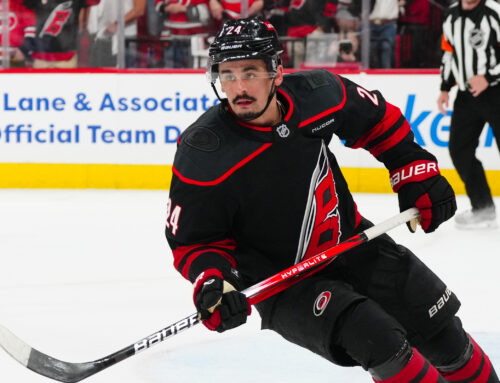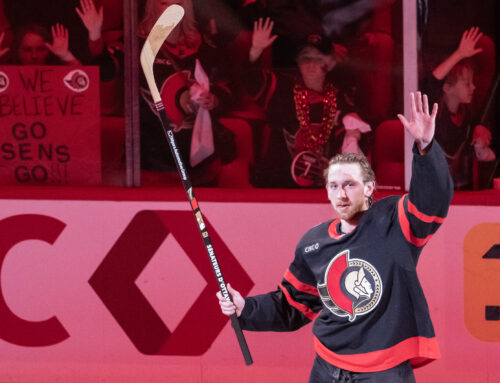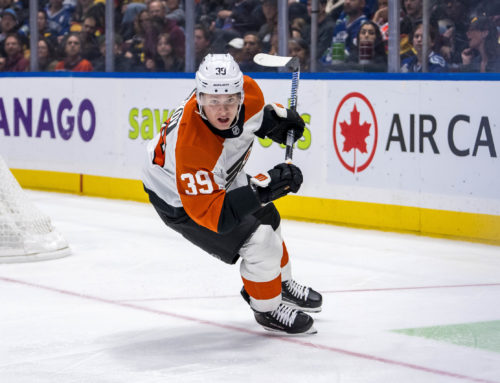In this week's Eastern Edge, we'll see how the East's most productive defensemen this year compare to those of recent years. This article was inspired by Grant's piece on the top 15 multi-category defensemen in the West, so I recommend you check that out over here.
The Process
I looked at the highest scoring defenseman from this season (2021), last season (2019-2020), and the year before that (2018-2019). There was a focus on four offensive categories: goals, assists, power-play points and shots on goal. My scoring system looked like this:
1 Goal = 2 Points towards 'Score'
1 Assist = 1 Point towards 'Score'
1 Power-Play Point = 1.5 Points towards 'Score'
1 Shot = 0.2 Points towards 'Score'
So, after some quick math, each player was left with a final score that represented his offensive output in a given season. For example, this year, Jeff Petry has six goals, 10 assists, six power-play points and 45 shots. That translates to a 'Score' of 40 (12 + 10 + 9 + 9 = 40). Importantly, these lists only include defensemen who are currently in the Eastern Conference.
The Results
| Rank | 2021 | Score | 2019-2020 | Score | 2018-2019 | Score |
| 1 | Jeff Petry | 40 | John Carlson | 166.8 | John Carlson | 169.5 |
| 2 | Victor Hedman | 38.9 | Victor Hedman | 130 | Keith Yandle | 169.3 |
| 3 | Morgan Rielly | 38.3 | Tony DeAngelo | 126.3 | Morgan Rielly | 168.1 |
| 4 | John Carlson | 37.2 | Zach Werenski | 117.9 | Kris Letang | 141.7 |
| 5 | Keith Yandle | 33.7 | Kris Letang | 116.9 | Victor Hedman | 139.9 |
| 6 | Aaron Ekblad | 33 | Keith Yandle | 107.3 | Erik Gustafsson | 136 |
| 7 | Dougie Hamilton | 28.9 | Dougie Hamilton | 106 | Thomas Chabot | 130 |
| 8 | Charlie McAvoy | 27.4 | Ivan Provorov | 103 | Dougie Hamilton | 119.3 |
| 9 | Shea Weber | 25 | Jeff Petry | 100.6 | Rasmus Dahlin | 118.4 |
| 10 | Thomas Chabot | 23.8 | Shea Weber | 100 | Jacob Trouba | 117.4 |
| 11 | Nick Leddy | 23.5 | Thomas Chabot | 98.7 | Zach Werenski | 111.1 |
| 12 | Adam Fox | 23.1 | Adam Fox | 94.5 | Rasmus Ristolainen | 109.9 |
| 13 | Seth Jones | 22.5 | Rasmus Dahlin | 90.5 | Jeff Petry | 109.9 |
| 14 | Kris Letang | 21.5 | Ryan Pulock | 89.6 | Seth Jones | 106.8 |
| 15 | Filip Hronek | 21.3 | Mikhail Sergachev | 87.1 | Shayne Gostisbehere | 103 |
| 16 | Rasmus Dahlin | 21.1 | Matt Niskanen | 85.7 | Aaron Ekblad | 101 |
| 17 | Jake Muzzin | 21.1 | Aaron Ekblad | 84.4 | Damon Severson | 97.2 |
| 18 | Mikhail Sergachev | 20.7 | Filip Hronek | 80 | Ryan Pulock | 95.5 |
| 19 | Justin Schultz | 20.6 | Jacob Trouba | 79.6 | Shea Weber | 89.2 |
| 20 | Ivan Provorov | 20.2 | Rasmus Ristolainen | 78.1 | P.K. Subban | 88.6 |
When it comes to offensive production from defenseman, John Carlson represents the gold standard. He leads all defensemen in scoring over the past few years, tallying 227 points in 248 games since the beginning of the 2017-2018 campaign. He's tallied 97 power-play points in that span, which comfortably leads all defenseman, but also ranks eighth among all skaters. His fantasy value might start dropping off once Ovechkin slows down and Washington's power play becomes less potent, but I don't think many of us are willing to bet against the Great Eight after his continued disregard of age-related decline.
Jeff Petry got off to a scorching-hot start this season, posting 13 points in his first 10 appearances. He's cooled off since, tallying three points over his last seven outings. This recent dry spell has spread through the whole team, with the Canadiens scoring just 13 goals in their last seven games. Despite the lack of recent offense, Petry still sports a shooting percentage of 13.3-percent on the season. When you consider he's scored on 6 to 7-percent of his shots in previous years, it's fair to expect some more regression as the campaign progresses. As this list highlights, Petry has been – and continues to be – a top fantasy defenseman from the Eastern Conference.
One player that I'm surprised to see make the list this season is Jake Muzzin. He's been a strong multi-category defenseman in recent years, with significant contributions to the hits and blocks categories. However, his offensive production has been relatively underappreciated throughout his career, usually hovering around that 40-point mark. He's off to a really strong start this season, with 12 points through 19 games. That translates to 52 points in 82 games, or 35 points in this year's 56-game season. Although that seems unsustainable, it's worth noting that Muzzin scored at a similar pace during the 2017-2018 campaign, when he posted 42 points in 74 games. Admittedly, he saw a prominent power-play role that season, which allowed him to tally 14 points with the man advantage. He isn't really being used on the power play this year, so he'll be hard-pressed to maintain this high level of offensive production. Additionally, he's also going to be sidelined for an unknown amount of time with a broken facial bone. If you're in a league that focuses on offensive production and you can still sell high on Muzzin, I'd try trading him. However, if you're in a multi-category league, Muzzin still provides a lot of value outside of his offense, so he'll be worth keeping even after the offense dries up a bit.
A broken foot and some internal competition from Tyson Barrie caused Rielly's offensive production to suffer last year. His 27 points in 47 games last season translated to 47 points over 82 games – a far cry from the 72 points he tallied in 2018-2019. Rielly has rebounded nicely in 2021, posting 16 points through 20 appearances. He's currently seeing 70-percent of Toronto's power-play time and has made the most of it, posting nine power-play points already. To give you some perspective, he saw a 53-percent share of power-play time last year and posted seven power-play points through 47 games. Barrie's departure has clearly benefitted Rielly, who is thriving as a prominent piece of Toronto's lethal power play.
The 25-year-old defenseman broke out with 41 points in 67 appearances last season, which works out to 50 points over 82 games. He's maintained an impressive level of offensive production so far this season, posting 11 points through 17 games. I'm very optimistic about Ekblad from a fantasy perspective because he's being trusted with such a big role. He's averaged 25 minutes of ice time this season, which represents a two-minute jump from last year. More importantly, he's seen 70-percent of the team's total power play time, which translates to three minutes on the man advantage per game. In previous years, Keith Yandle had been the team's lone power-play quarterback. This year, Yandle and Ekblad play together on the top unit and it's worked out well for both parties so far. Yandle has nine power-play points through 17 games while Ekblad has six in the same span. Ekblad's offensive output had been limited in recent years because he didn't have much of a power-play role. Now that he does, I think he could be one of this year's most valuable fantasy defensemen.
Dougie Hamilton turned a lot of heads last year when he tallied 40 points in 47 appearances, which translates to 70 points over 82 games. That performance brought him into the conversation as one of the league's most offensively gifted defenseman. However, from a fantasy standpoint, he's been quite productive for a few years now. One thing that sets Hamilton apart from many other defensemen is his willingness to shoot the puck. He's averaged over three shots per game since the 2017-2018 campaign, consistently cracking the top-5 in shots per game for defensemen.
The 30-year-old defenseman's current offensive numbers are inflated by a three-game stretch in late January that saw him tally six points. Outside of that stretch, he's found the scoresheet in just two of 10 games. While it's probably unfair to pick and choose small samples like that, I think it's important to mention so you don't get fooled by his overall production of eight points in 13 games. His offensive output in recent years hasn't been all that impressive, and his best performances in Pittsburgh came when Kris Letang was sidelined. Aside from those stints, he was held in a secondary role and his production reflected that. It's a similar situation in Washington, where Schultz has to play second fiddle to John Carlson. He's performed relatively well so far, but I'm not optimistic about his outlook this season and would prefer to sell high on him if the opportunity presented itself.





 FLA
FLA EDM
EDM MIN
MIN DAL
DAL UTA
UTA VAN
VAN STL
STL L.A
L.A TOR
TOR
